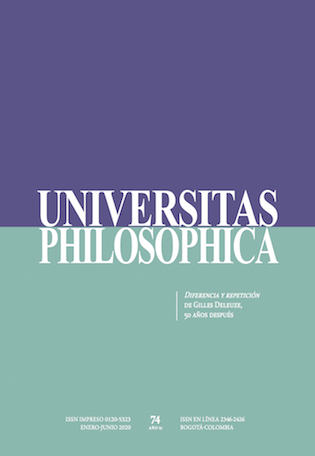Resumen
A diferencia de muchas imágenes del pensamiento dominantes en la filosofía y centradas en la búsqueda de fundamentos cuya coherencia se encuentra en lógicas binarias o relaciones biunívocas, la filosofía de Gilles Deleuze y Félix Guattari es un pensamiento por máquinas que producen multiplicidades puras en virtud de diferencias intensivas. Lo importante con las máquinas no es definirlas –no son delimitables– ni comprenderlas –son asignificantes–, sino que funcionen en la medida en que varios flujos circulan en ellas, entremezclándose o cortándose. Aun cuando toda máquina reúne elementos heterogéneos, las máquinas literarias son interesantes en cuanto pueden alcanzar un nivel de lo fragmentario tal que se exprese la potencia determinante de las diferencias intensivas. El artículo experimenta con la máquina literaria de Maurice Blanchot –en especial con su idea de lo neutro– en busca de operaciones que permitan desarticular los fundamentos (paradigmas, bivalencias, binarismos) de las imágenes del pensamiento dominantes.
Artaud, A. (1975). Para terminar con el juicio de Dios y otros poemas. Buenos Aires: Ediciones Caldén.
Barthes, R. (1994). El susurro del lenguaje. Más allá de la palabra y de la escritura. Barcelona: Paidós.
Barthes, R. (2004). Lo neutro. Notas de cursos y seminarios en el Collège de France, 1977-1978. Ciudad de México: Siglo XXI Editores.
Bident, C. (2012). R/M, 1953. Instantes y Azares. Escrituras nietzscheanas, 343-360.
Blanchot, M. (1950). Thomas l’obscure. París: Gallimard.
Blanchot, M. (1957). Le dernier homme. París: Gallimard.Blanchot, M. (1973). Le pas au-delà. París: Gallimard.
Blanchot, M. (1994). El paso (no) más allá. Barcelona: Paidós.
Blanchot, M. (2000). L’instant de ma mort / The Instant of My Death. En: Blanchot, M. & Derrida, J. The Instant of My Death / Demeure (pp. 1-12). Stanford: Stanford University Press.
Blanchot, M. (2005). El libro por venir. Madrid: Trotta.
Blanchot, M. (2008). La conversación infinita. Madrid: Arena Libros.
Deleuze, G. (1972). Proust y los signos. Barcelona: Anagrama.
Deleuze, G. (1996). Crítica y clínica. Barcelona: Anagrama.
Deleuze, G. (2002). Diferencia y repetición. Buenos Aires: Amorrortu.
Deleuze, G. (2005). Lógica del sentido. Barcelona: Paidós.
Deleuze, G. (2008). Dos regímenes de locos. Textos y entrevistas (1975-1995). Valencia: Pre-Textos.
Deleuze, G., & Guattari, F. (1990). Kafka. Por una literatura menor. México D. F.: Ediciones Era.
Deleuze, G., & Guattari, F. (2002). Mil mesetas. Capitalismo y esquizofrenia. Valencia: Pre-Textos.
Deleuze, G., & Guattari, F. (2016). El Antiedipo. Capitalismo y esquizofrenia. Barcelona: Paidós.
Deleuze, G., & Parnet, C. (1980). Diálogos. Valencia: Pre-Textos.
Derrida, J. (1972). Positions. París: Les Éditions de Minuit.
Derrida, J. (1998a). Demeure. Maurice Blanchot. París: Galilée.
Derrida, J. (1998b). Políticas de la amistad seguido de El oído de Heidegger. Madrid: Trotta.
Derrida, J. (2006). Márgenes de la filosofía. Madrid: Cátedra.
Heidegger, M. (2015). Reflexiones II-VI. Cuadernos negros (1931-1938). Madrid: Trotta.
Kafka, F. (2012a). Ante la ley. Bogotá: Random House Mondadori.
Kafka, F. (2012b). El silencio de las sirenas. Bogotá: Random House Mondadori.
Mathews, J. (1948). A Note on Valéry. En: P. Valéry, Monsieur Teste (pp. v-xiv). Nueva York: Alfred A. Knopf.
Musil, R. (2012). El hombre sin atributos (Vol. I). Barcelona: Seix Barral.
Nelson, L. (1992). Introduction. En: M. Blanchot, The Step Not Beyond (pp. v-xxi). Nueva York: State University of New York Press.
Nietzsche, F. (2016a). Obras completas (Vol. I). Escritos de juventud. Madrid: Tecnos.
Nietzsche, F. (2016b). Obras completas (Vol. IV). Escritos de madurez II y Complementos a la edición. Madrid: Tecnos.
Proust, M. (2015). A la busca del tiempo perdido. (M. Armiño, Trad.) Madrid: Valdemar.
Rumi. (2005). The Book of Love. Poems of Ecstasy and Longing. (Trad. C. Barks). California: HarperCollins.
Sloterdijk, P. (2006). Esferas III: Espumas. Madrid: Siruela.
Sloterdijk, P. (2011). Sin salvación. Tras las huellas de Heidegger. Madrid: Akal.
Sloterdijk, P. (2013). Nietzsche Apostle. Los Ángeles: Semiotext(e).
Sloterdijk, P. (2014). El Sol y la muerte. Madrid: Siruela.
Valéry, P. (1960). Monsieur Teste. En: Œuvres II. La Pléiade (pp. 14-157). París: Gallimard.
Žižek, S. (2012). Less Than Nothing. Hegel and the Shadow of Dialectical Materialism. Nueva York: Verso.

Esta obra está bajo una licencia internacional Creative Commons Atribución 4.0.
Derechos de autor 2020 Constantino Villegas



